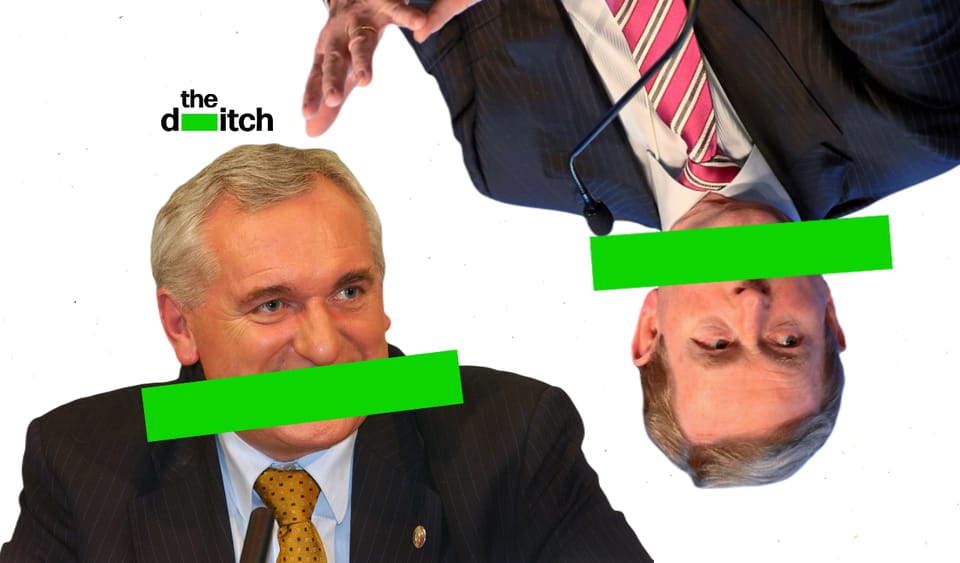History (What’s up with that?)
- M.I.A.
I remember as a child asking Mum, on the days after general elections, if the people she voted for won. No, she’d tell me, the people she voted for never won, but that was fine, she was happy enough to vote for what she believed in. Mum voted and votes left. In the old Donegal South-West constituency in the 90s and early aughts the left wasn’t winning. (Is it winning in the new Donegal constituency with two Sinn Féin TDs? Another question, one to which I’ll not ask for an answer from Ivana Bacik and the Labour Party.) I’m thankful for these memories, for what Mum taught me, because I learnt early that elections aren’t like football matches, that parties (and ideologies) aren’t just teams to support – and that if they were, if these are the terms you think in, you’d better not choose the left.
The Irish left, electorally at least, has played for Team Cope the entire history of the state. In that narrow sense, which considers seats in the Dáil the only mark of progress, the left barely exists. Its contributions to Irish and international society have come away from the chamber: decades-long campaigns, which the state and its organs insisted were quixotic, that forced the country to recognise gay marriage and provide abortion; the movement to defeat a regressive tax in the water charges, which supranational institutions sought to impose on working people and which would’ve likely led to a privatisation of a natural resource; when Irishmen volunteered to fight fascism in Spain and when they helped bomb apartheid South Africa.
For the Irish Free State to function and to advance the interests of its ruling class it required the two parties that would grow into Fianna Fáil and Fine Gael. These parties needed a set of stories to justify their existence and lend legitimacy to each, a mythology, as Roland Barthes put it, that would bring “a natural and eternal justification… a clarity which is not that of an explanation but that of a statement of fact.” The mythos that each embraced has been, as far as these affairs go, relatively rich: they’re the Civil War parties, born from the bloodshed that birthed this very nation. It helps obscure the obvious, that they’re the same party serving the same interests, both management committees for the wealthy, for landlords and property developers, for capital domestic and foreign.
That’s how myth works. “It organises a world which is without contradictions because it is without depth, a world wide open and wallowing in the evident, it establishes a blissful clarity: things appear to mean something by themselves,” wrote Barthes.
‘No doubt, if you’re like me, you remember things’
The century of Fianna Fáil, Fine Gael and their antecedents’ rule is proof enough of the project’s success. And this mythology is durable, can be rewritten to fit the conditions around it. Where once we were to believe in the immutable differences between the country’s historically largest parties, as well as their own aspirations for sole leadership of the state, we’re now to embrace the sentiments with which Micheál Martin spoke of their entry into coalition together in 2020. “I think it's also a moment of opportunity and a moment of hope for our people,” he said. How mature, how sensible.
This kind of rewrite needn’t be indulged, but it is, with every analysis of last week’s general election that doesn’t prioritise the continuing collapse in historic support for Fianna Fáil and Fine Gael. At just more than 40 percent between them, it was their lowest ever combined first preference share. A century or two from now, what’s likely to be considered more significant, to be written about in history books: a percentage point or seat or two relative to the 2020 general election, or the continued emergence of an electoral left, the continued politicisation of the Irish electorate?
Look at what was recently considered success and failure for Fine Gael and Fianna Fáil.
As a Fine Gael MEP once said, “No doubt, if you’re like me, you remember things…” like when Robbie Keane put the ball in the Germans’ net in the 2002 World Cup. If you’re on the left momentarily forget what Keane was up to the last few years and allow yourself that fond memory. It’s likely vivid – it wasn’t long ago.
That same summer Fine Gael “party members were in tears” as they came to terms with their failures in the May general election. Michael Noonan, a man left and right can agree is as fine an embodiment you’ll find of Fine Gael values and ideology, was forced to resign as party leader the night the results came in. "It is a very bad day for Fine Gael. It was beyond our expectations and beyond our worst fears, a seriously bad election result for our party," he said.
This was a catastrophe. But Fine Gael recorded just seven fewer seats, 31, than this year. It returned a higher first preference vote share of 22.5 percent.
Five years after that Fine Gael “meltdown”, as Charlie Bird called it, Fianna Fáil had an “amazing result” in the 2007 general election. “It was not alone Fianna Fáil's opponents who were stunned by their astonishing performance this time. Many in Fianna Fáil simply did not believe it was possible,” wrote Gene McKenna – whom the party months later appointed its chief press officer – in the Irish Independent.
This result took Fianna Fáil and its adversaries by surprise because of the spectre of the Mahon Tribunal, which was to resume four days after the election. When the inquiry was to resume it would investigate the allegation that Bertie Ahern had received £80,000 from Cork developer Owen O'Callaghan. When the tribunal’s report was finally published it found that Ahern “gave untrue evidence about the source of over £215,000 lodged in bank accounts connected to him”. Untrue evidence.
Against that – all that – Fianna Fáil recorded this amazing result: 78 seats, a slight drop from its previous 81, with a 41.6 percent share of first preference votes. That’s what success is for the soldiers of destiny, the kind of success the state’s electoral politics is founded on.
The aftermath of last week’s election, the reports of a future unedifying request from Fine Gael for its leader to be taoiseach for a spell (as well as the equally embarrassing prospect of Fianna Fáil having to acquiesce) is something different.
If this is winning…
Paschal Donohoe enjoyed last Saturday, fair play to him. Speaking of Sinn Féin he said, “It’s now very evident that they’re the weakest opposition party in Europe.” Maybe he’s right, given Sinn Féin’s unusually poor result. It’s unusual in a global context, with more than 80 percent of countries considered democracies having their incumbent government parties lose seats or vote shares in elections this year.
Whatever advances the left has made in Ireland seem, sometimes, to have been in spite of portions of its political representation. “In the face of the most brutal personal dislocations, we lack a vocabulary to express our dismay. Furthermore, at least at this point, we seem to lack political leadership capable of articulating both the distress of the have-nots and the malaise in the middle. Thus there is no sure way to predict which way America's embattled middle class will turn,” wrote Barbara Ehrenreich in 1986. “But America,” she wrote, though she might as well have been writing about Ireland, “is unique in ways that still make any prediction foolhardy. For one thing, Americans are notorious for their lack of class consciousness or even class awareness.”
Whether Irish electoral politics continues its recalibration towards left-right – rather than mythological so-called Civil War – lines is also unclear. But that's the way history is, slowly, marching and it can be hard to stop. I still believe in a misunderstood and mistranslated man who once said we, the actual left, will attend the funeral of those we oppose.
One time Mum does remember winning was when her Meath East pick, Labour’s Brian Fitzgerald, got elected as a TD in 1992. She was delighted. This was what winning felt like. Mum only remembers one of his contributions during the 27th Dáil, when he gave a passionate defence of greyhounds killing hares for sport. “The coursing fields of Ireland have brought Catholics, Protestant and Dissenter together,” he said.
If that’s winning, a Labour TD getting into government to proselytise for hare coursing, fuck that.


